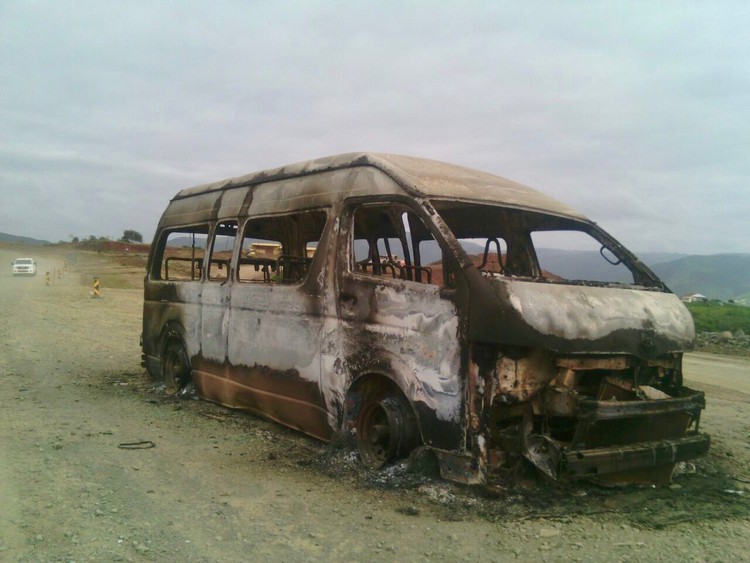Mthatha taxi violence leaves commuters stranded
Key Eastern Cape route closed to taxis
Taxis have been banned from the busy route between Mthatha and Port St Johns for six weeks following taxi violence, leaving commuters stranded.
Four men have appeared in court in Ngqeleni in connection with the violence which has claimed four lives this month, bringing the total number of victims to 30 in a year.
The men are facing charges ranging from murder and attempted murder to possession of an unlicensed firearm, ammunition and dangerous weapons. They were arrested last week after two people were killed and eight injured when about 20 men armed with bush knives, pangas and guns barged into Ntlanza taxi rank near Libode last week stabbing, shooting and hacking people. A taxi was set alight.
This followed the shooting of a couple involved in the taxi industry in their home in Thabo Mbeki Township in Libode.
Uncedo Taxi Association (Usta) and Border Alliance Taxi Association (Bata) are fighting over the R61 route between Mthatha, Port St Johns and Lusikisiki. Both claim the route belongs to them.
Last year in November, the two associations signed a peace accord but violence erupted again this month.
On 24 March the Eastern Cape MEC for Transport Weziwe Tikana closed down taxi operations on the R61 between Mthatha and Port St Johns for six weeks.
Among taxi ranks closed are Circus Triangle rank in Mthatha, the Ntlaza taxi rank, Port St Johns and Ngqeleni taxi ranks. People who need to travel between these towns have to resort to hitch hiking.
GroundUp spoke to some commuters who live in Libode and work in Mthatha. Most welcomed Tikana’s decision to close the taxi ranks, saying this would be a wake-up call for taxi owners as they would lose money. But those who had transport contracts with taxi drivers are struggling.
Sisanda Malgas from Ngqeleni, said she had to hitch-hike from Ngqeleni to Mthatha. She had just returned from sick leave after narrowly escaping being attacked inside a taxi going home to Ngqeleni last week.
“I was lucky because I was about to get off. A bakkie full of men started stoning the taxi. The driver quickly stopped and told us to all jump. We were only three left. We jumped, and they chased the taxi away. Since then, I have been scared to take a taxi again,” she said.
Malgas said she and her other colleagues had a contract with the taxi, which was part of Bata, and wished the taxi violence would end.
Other people affected with the closure of taxi ranks are students who study in Mthatha. Lulama Njani from Ngqeleni told GroundUp she had to hire a small car to take her two children to school until school closes on Friday.
She had to borrow R400 from a neighbour to pay for her children’s transport.
“We are happy that the MEC is doing something to solve the taxi violence but we are really struggling a lot,” she said.
“Most people rely on hitch-hiking; you can see how they rush, pushing each other just to find transport to work,” she said.
Priscilla Shozi from Lusikisiki, who studies in East London, said she was worried that she would not be able to go home next week if taxi ranks were not reopened.
Usually, she takes a taxi from East London to Mthatha, then another taxi from Mthatha to Lusikisiki.
“There’s no other way to Lusikisiki; we have to pass Mthatha. If there are no taxis, then I must forget about going home,” she said.
Spokesperson for Usta OR Tambo branch, Bishop Zola Yolelo, said the two associations had met last week Friday and were in talks about ending the violence.
SA Police Service Commissioner of the Eastern Cape Liziwe Ntshinga commended the police for the arrests of the seven men. “We will continue to put the safety of commuters first and intolerance and violence will not be allowed,” she said.
Ntshinga said the task team on taxi violence had been provided with additional resources from the National Intervention Unit, Public Order Policing, and detectives and intelligence officers.
Support independent journalism
Donate using Payfast

Don't miss out on the latest news
We respect your privacy, and promise we won't spam you.
Next: City of Cape Town takes bold step in Tafelberg battle
Previous: PE families live with burst sewer pipe for three years
© 2017 GroundUp. 
This article is licensed under a Creative Commons Attribution-NoDerivatives 4.0 International License.
You may republish this article, so long as you credit the authors and GroundUp, and do not change the text. Please include a link back to the original article.

